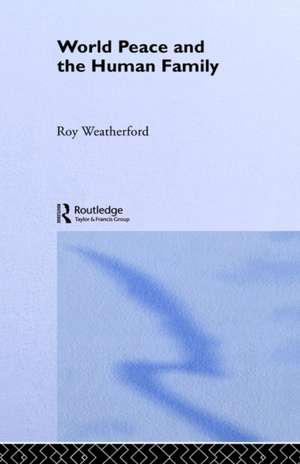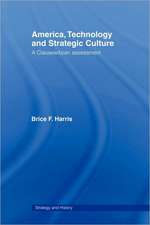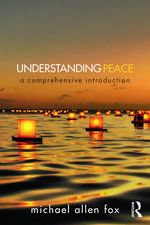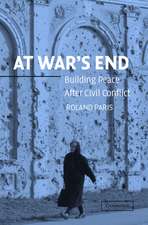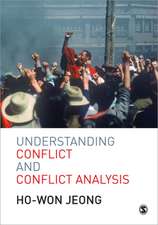World Peace and the Human Family: Points of Conflict
Autor Roy Weatherforden Limba Engleză Paperback – 24 iun 1993
Roy Weatherford argues that a profound change in social relations is imminent as national sovereignty yields to a democratic world culture, speaking a world language and living as a world wide family - the human family.
For too long world peace has seemed a noble but unattainable ideal. Weatherford shows that it is now both economically and politically possible and is therefore our moral duty.
| Toate formatele și edițiile | Preț | Express |
|---|---|---|
| Paperback (1) | 485.23 lei 6-8 săpt. | |
| Taylor & Francis – 24 iun 1993 | 485.23 lei 6-8 săpt. | |
| Hardback (1) | 1000.27 lei 6-8 săpt. | |
| Taylor & Francis – 24 iun 1993 | 1000.27 lei 6-8 săpt. |
Preț: 485.23 lei
Nou
Puncte Express: 728
Preț estimativ în valută:
92.85€ • 97.14$ • 77.13£
92.85€ • 97.14$ • 77.13£
Carte tipărită la comandă
Livrare economică 03-17 aprilie
Preluare comenzi: 021 569.72.76
Specificații
ISBN-13: 9780415063036
ISBN-10: 0415063035
Pagini: 192
Dimensiuni: 127 x 203 x 11 mm
Greutate: 3.18 kg
Ediția:New.
Editura: Taylor & Francis
Colecția Routledge
Seria Points of Conflict
Locul publicării:Oxford, United Kingdom
ISBN-10: 0415063035
Pagini: 192
Dimensiuni: 127 x 203 x 11 mm
Greutate: 3.18 kg
Ediția:New.
Editura: Taylor & Francis
Colecția Routledge
Seria Points of Conflict
Locul publicării:Oxford, United Kingdom
Cuprins
PREFACE, 1. World peace as an ideal, 2. World peace as a possibility, 3. World peace as an institution, 4. The human family as an ideal, 5. The human family as a possibility, 6. The human family as an institution, 7. Economic interdependence, 8. Cultural interdependence, 9. Environmental interdependence, 10. What is important?, 11. Who is a person?, 12. Utilitarianism for the family, 13. Conclusion: a family at peace, NOTES, SELECT BIBLIOGRAPHY, INDEX
Descriere
Weatherford argues that a profound change in socia l change is imminent as national sovereignty yield s to a democratic world culture. He argues that world peace is both politically and economically p ossible and is therefore our moral duty.
